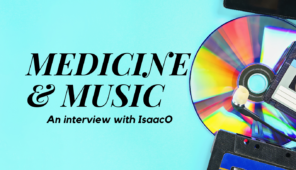From medicine…to the arts!
Edward Crook, doctor and actor, tells us how he went from medicine to the arts! Was his medical training really of benefit?
Medic Footprints were terribly excited when Edward Crook reached out! He’s a doctor who’s currently pursuing a career in the arts whilst training at LAMDA.
There are plenty of doctors who decide to pursue a career in acting, music, drama and beyond, so we catch up with him to find out whether his medical training was really of any benefit when landing a variety of roles in the West End and Paris…
Why did you choose a career in medicine? What were your extracurricular interests at this time?
I was stuck at the time between studying art or medicine. I was told that I could always do art in my spare time but medicine was a great opportunity and I should take it.
I think school tried get you to study the ‘best’ degree that you could, especially one that provides a safer long term option. I was working as a porter at the time, and I think I was afraid of missing out on the opportunity and regretting it later on. I think a part of me also wanted to prove to myself that I could do it.
When I was younger I loved watching shows on A&E and in hospitals, and loved the Australian show ‘Flying Doctors’, so I think that spurred me on initially. I also enjoyed reading about Che Guevara in the motorcycle diaries, as he also started out as a medical student – I think the sense of adventure appealed to me. At that time, my extra curricular activities included playing basketball for Lincolnshire, playing guitar, skateboarding and surfing. I also taught children a variety of sports at the local junior school.
Did you pursue the arts whilst studying and practicing medicine?
I didn’t actually do much acting before I went to University, but I had always wanted to.
I got a main role in ‘Footloose’ for the Medic’s Musical and loved it. Unfortunately I spent too much time doing that and had to resit my Obs and Gynae OSCE, so I didn’t do any more whilst I was studying.
I completed two shows during F1, which was almost impossible to juggle, and a further show during my F2 year. After leaving training I spent time locuming and did a variety of acting things including adverts, TV pilots and workshops before deciding to apply to drama school.
Why did you eventually decide to focus on drama as a career change move? What kind of response did you receive from your friends, family and colleagues?
I decided that medicine wasn’t for me probably quite early in medical school, but only made a firm decision and plan to leave during my elective in Fiji. The prospect of coming back and working as a doctor made me miserable, which isn’t really something people tended to sympathise with or appreciate at the time.I made a plan to do as much acting as I possibly could to make sure I was making the right choice, and quickly decided that it was.
I spoke to friends who had studied acting and networked to find out more about what I needed to do to make a career out of it. From there, I spent the majority of my time working towards that goal. My initial aim was to complete F1 and F2, but, after speaking to other doctors who had left, and following a contract dispute, decided to leave part way through my F2 year.
From there I started locuming, which gave me the freedom to pursue acting whilst generating the income to put towards my drama school training.My family were very supportive, as was my partner. My friends found the decision a little strange, and I got a variety of responses from colleagues, most of whom, I think, thought the idea was ridiculous.
Has medicine helped your career transition into acting/ drama in any way? How are you finding your work/life balance?
Medicine really helped – I couldn’t have funded the course without locuming!
I was lucky enough to receive a scholarship to LAMDA, but it still required a fair bit of money from my end. I think being a doctor exposes you to a huge variety of people and situations, and this can have good and bad repercussions.
I think I struggled with the fact that I always felt a bit of guilt for leaving, and that I would have to be very successful to make it a worthwhile transition, which wasn’t a useful attitude to have, and one that took some time to get rid of.
In the past few months I have performed in a couple of shows in West London, a showcase in the West End and a tour to Paris and it has been incredible.
When I have some time off, I go back to the hospital that I have a good relationship with and locum. This enables me to still be a doctor for several months of the year and helps me to support myself. It really is a great balance, and gives me the freedom to do what I want to do.
What advice would you give to medics who are considering switching over to the arts full time?
Something someone said to me when I was doing my foundation training was;
” But you’ve studied for five years, what a waste!”
The truth is, it wasn’t a waste; I got a lot out of it, made some great friends, and have gained some skills for life.
It’s much better to ‘waste’ five years [studying medicine] than continuing to do something that makes you unhappy for a further forty years.
If you want to pursue something, whether it be acting or anything else, my best advice would be to do it. You will always have your degree, and can always come back to medicine if you choose to later on. Keeping your registration is probably a wise decision, as it leaves you with more options in future.
Being a locum doctor enables you to help people and gives you the freedom that you end up missing out on during training. I definitely made the right decision for me, and am enjoying every minute of it. It is daunting, leaving medicine, and I would advise setting goals and then working out how you are going to achieve them. People will always voice their opinions, but, at the end of the day, it’s important that you pursue what makes you happy.
Eme Dichoso
Latest posts by Eme Dichoso (see all)
- Digital health innovation investment for doctors - 29th May 2019
- Online Career Coaching Course for Doctors Making a Change - 4th April 2019
- The real life of a forensic medical examiner - 5th February 2019


